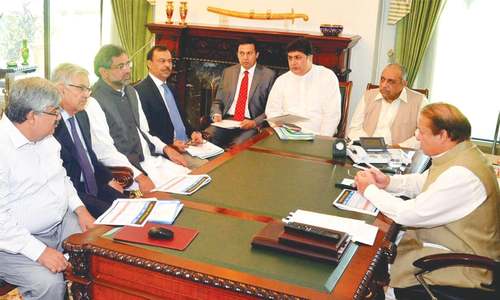ISLAMABAD: Finance Minister Ishaq Dar joined crucial talks with International Monetary Fund (IMF) in Dubai on Monday which would determine whether or not the beleaguered textile industry be extended a bailout package.
The country’s textile exports declined 5.4 per cent in the first quarter (July-September) of the current fiscal year amid global slowdown and rising input costs, and the industry has been demanding government support to reverse the trend.
The staff level talks have been in progress since Monday last in Dubai for the ninth review of the $6.4 billion bailout package that the fund extended to Pakistan in September 2013 for 36 months. Pakistan’s side has, so far, been led by Finance Secretary Dr Waqar Masood Khan in talks with IMF, led by Herald Finger, the IMF mission chief to Pakistan.
Policy level talks from Islamabad would now be led by the finance minister to resolve major issues of the fund programme that has seen over 12 waivers on non-performance of programme criteria in two years.
Informed sources said hitches in structural reforms in the energy sector, shortfalls in revenue collections and lack of progress in improvement of public sector entities were also figuring prominently in talks that required finance minister’s push to move forward but a bailout package for the textile industry was the government’s key focus in these talks.
An official statement said the minister had an in-depth update of the staff level talks held so far from his team soon after his arrival from Islamabad and discussed strategy for the policy level part of the talks.
The sources said the finance minister would take the IMF mission into confidence over a recent government decision to impose regulatory duty on import of yarn and fabric despite shortfall in domestic cotton production target.
He would try to convince the fund mission how important the textile sector was for Pakistan’s balance of payments position given negligible support from the foreign direct investment. Although remittances from Pakistani workers abroad have, so far, extended a helping hand, a further slide in the country’s exports, if allowed to remain in-competitive, would lead to depletion of foreign exchange reserves that were so important for IMF’s loan repayment and stable exchange rate.
Therefore, the two sides are expected to agree on a staggered support to the textile industry that was getting non-competitive with regional peers in the global market, provided the finance minister is able to convince the fund that the budgetary support to textiles would be offset by some other tradeoff to remain within committed fiscal deficit limits.
The talks are expected to conclude on Nov 4 and the two sides are expected to make a joint announcement of the conclusion of talks in Islamabad on Nov 5.
Before leaving for talks last week, Tokhir Mirzoev, the IMF country representative in Islamabad had said the fund would seek explanations on the proposed textile and agriculture package, besides focusing on taxation and energy.
He had said that progress on structural reforms in energy and taxation were crucial to build on stability achieved so far and creating jobs, improving business climate and putting economy on a sustainable growth path.
Based on data in these areas, “the mission would evaluate if end-year targets could be achieved”, he had said.
The government announced a Rs341bn incentive package for agriculture sector recently and has been in talks with textile industry for a bailout package for quite some time.
Mainly because of shortfalls in tax collections in the first quarter (July-September) of the current fiscal year, the IMF has already scaled down its projections for development expenditure by around Rs378bn – around Rs64bn cut in federal and over Rs314bn cumulative shortfall in provincial development expenditure against budgetary announcements.
The IMF believes that Pakistan has achieved a reasonable stability in fiscal and monetary indicators, but it would be ‘unfortunate’ if it failed to take its benefit pushing through structural reforms, hampering job creation, investment and economic growth.
Also it understood energy challenge was affecting all sectors of economy because of inability of the distribution companies to recover their bills and could not pay their suppliers, including fuel providers and private power producers.
Resultantly, the power sector was facing working capital shortfalls, leading to downward spiral migrating across the sector and failing to invest in loss reduction programmes and theft control despite repeated tariff increases and imposition of various surcharges on honest paying consumers.
Pakistan has, so far, completed eight reviews of the extended fund facility (EFF) programme with total disbursements of about $4.54bn.
A total of four more quarterly reviews and around $1.6bn disbursements would complete the programme in August 2016 before the two sides consider a follow-up programme.
Published in Dawn, November 3rd, 2015
On a mobile phone? Get the Dawn Mobile App: Apple Store | Google Play













































